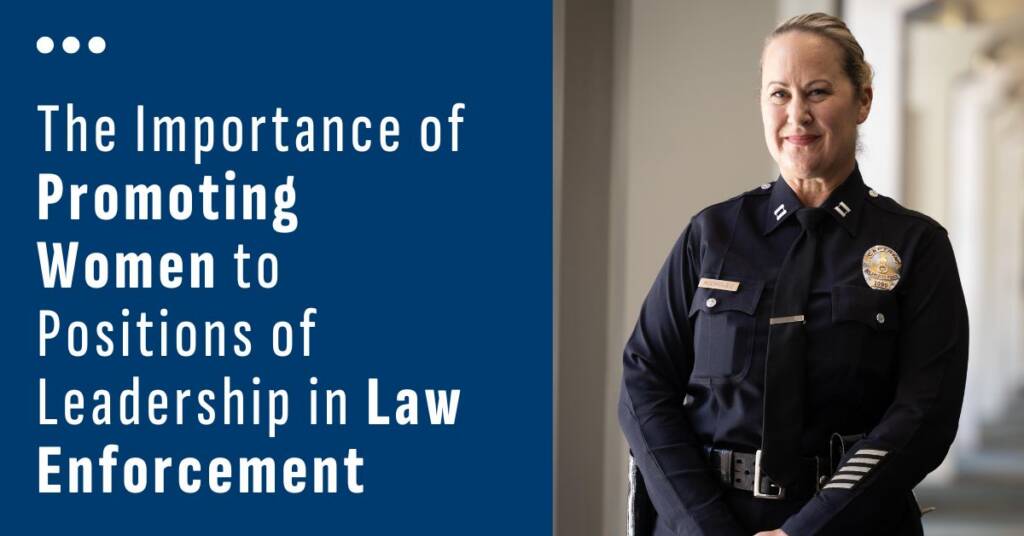There are many opportunities in federal, state and local law enforcement for both current law enforcement professionals and those hoping to enter the field. But because these positions can be highly competitive, candidates must do whatever they can do to differentiate themselves.
One of the most appealing qualifications for hiring committees is an applicant with a law enforcement degree. Both undergraduate and advanced degrees help position law enforcement professionals as a first-choice option for a current job opening, as well as future leadership positions.
Depending on which branch of law enforcement you’re looking to enter, there are certain degree programs that will set you up for success in federal, state or local law enforcement agencies. Because many federal jobs deal with highly sensitive information, there is generally a long list of preferred and required qualifications that each agency looks for in candidates. For local and state level departments, qualifications can be less stringent or specialized. To help differentiate between the groups, here is a breakdown of the education and skill requirements for select federal, state and local law enforcement agencies.
Education and Skills Requirements for Select Federal Law Enforcement Jobs
Higher education, in particular, is especially important at this level of law enforcement. It is important to note that the majority of federal law enforcement jobs require candidates to have at a minimum of a bachelor’s degree, with preference and advancement to certain pay grades given to those with advanced degrees (master’s degree and/or doctorate). There are also requirements that vary by agency that are not listed here. To see if you meet the minimum requirements, visit that particular agency’s website.
| Occupation | Preferred Degree (Bachelors and/or Masters) | Required Skills and Attributes | Skills and Experience Worth Special Consideration | Agency |
| FBI Special Agent | – Terrorism (Bio, Counter, International) – Criminal Justice – Cyber Security – Finance Forensic – Accounting/ Science International Studies – Law Enforcement and Public Safety | – Leadership – Oral communication – Initiative and Motivation – Adaptability and flexibility – Organizing, planning and prioritizing – Interpersonal skills – Evaluating information and making decisions – Writing | – Foreign language skills (to interview witnesses) – IT skills (to locate evidence within a computer network) – CPA certified (to uncover hidden assets)
| FBI |
| DEA Agent | – Criminal Justice – Law Enforcement and Public Safety Law – Finance | – Written and Oral Communication – Attention to Detail/Memory – Decision-making/judgment – Interpersonal skills – Integrity/Honesty – Flexibility; Problem-solving – Self-management – Teamwork | – Finance/Accounting – Information Systems/ Telecommunications – Electrical/Mechanical Engineering – Military leadership experience or a foreign language fluency | Drug Enforcement Administration (DEA) |
| US Marshal/Deputy Marshal | – Law Enforcement – Criminal Justice – Sociology – Law | – Interpersonal skills – Planning and project management skills – Knowledge of law and court procedures – Written and oral communication | Superior academic achievement | Department of Justice (DOJ) |
| US Border Patrol Agent | – Law – Law Enforcement and Public Safety – Police Science – Criminal Justice | – Logical reasoning – Spanish language fluency or the ability to learn Spanish – Interpersonal skills – Ability to maintain composure and make decisions in a stressful situation – Ability to analyze information rapidly | Spanish language skills | Homeland Security (DHS) |
| Postal Inspector
| – Law Enforcement – Criminal Justice – Law – Computer Science | – Interpersonal skills – Written and oral communication skills | – Foreign language skills – Prior postal experience – Academic achievement – Military experience – Law degree – Law enforcement experience – Certification in auditing or investigations – Computer science education – Computer systems certification – Bio-terrorism investigation experience | US Postal Inspection Service |
| US Secret Service Special Agent/Uniformed Crew | Criminal Justice, Law Enforcement and Public Safety, Law or Pre-Law | – Superior academic achievement or a graduate level education – Written and oral communication skills – Ability to analyze and summarize information – Deadline driven – Presentation skills | – Foreign language fluency – Past military or law enforcement experience -Graduate level education | Homeland Security (DHS) |
| ATF Special Agent | – Law Enforcement and Public Safety – Criminal Justice – Sociology – Psychology – Political Science | – Verbal, quantitative and investigative reasoning | – Strong writing and leadership skills | Bureau of Alcohol, Tobacco, Firearms, and Explosives (ATF) |
In addition to an advanced degree in a related field, most agencies also list a number of additional qualifications such as legal knowledge, financial acumen and leadership skills as highly important factors for successful candidates looking to build a career with a federal agency. Finally, the majority of federal law enforcement jobs require a physical ability test, drug screening, aptitude tests, a citizenship requirement and more depending upon the specific agency and job. All qualifications and application information can be found on the agency websites.
Education and Skills Requirements for Select State & Local Law Enforcement Jobs
Conversely, what’s are the best degree programs for those looking to pursue a state or local law enforcement job? And what other skills do candidates need to be competitive? The below chart outlines a sampling of law enforcement jobs at the state and local level, along with the degrees and skills most highly sought by each department.
| Occupation | Preferred Education Level | Required Skills and Attributes | Skills and Experience Worth Special Consideration | Agency/Department |
| Police Officer I | High School Diploma or GED; or 2- or 4-year degree | – Interpersonal Sensitivity – Communication Skills – Problems Solving Ability – Judgment Under Pressure – Observational Skills – Learning Ability – Dependability – Physical Ability – Desire for self-improvement | San Diego PD | |
| Sergeant | High School Diploma or GED plus an Associate’s Degree or 60 semester credit hours from an accredited institution | – Honor – Service – Integrity – Respect – Trust – Courage – Duty | Complete 4 years of service within the department | Pennsylvania State Police |
| Chief of Police | High School Diploma or GED; or 2- or 4-year degree. Nebraska Law Enforcement Training Graduation or commensurate experience | – Outstanding interpersonal, organizational, and leadership skills – Extensive knowledge in the supervision, operations and administration of law. – Expert communication skills – Ability to work effectively with the governing body, management team, employees and the community. | – Experience in supervisory roles – Military experience | City of Minden, NE Police Department |
| Sheriff’s Captain | – Graduating from high school, OR – Passing the General Education Development (GED) Test, OR – Passing the California High School Proficiency Examination, OR – Having attained a two-year, four-year or advanced degree from an accredited college or university. – Leadership positions require additional examination/certification | – Ability to learn California codes – Excellent strength, endurance, and physical abilities – Ability to stay calm under pressure – Excellent interpersonal skills | Special skills, training, experience, and education are considered, including military experience. | Ventura County Sheriff’s Department |
| Law Enforcement Special Agent II | – Possess a bachelor’s degree from an accredited college or university. – Two years of law enforcement experience with a governmental law enforcement agency. – Certified CLEET peace officer or possess a certification by reciprocity agreement from another state. – One year of professional experience in conducting criminal investigations for a governmental law enforcement agency. | Must be able to perform, supervise and direct a broad range of highly technical, complex and professional level law enforcement and investigative activity. | Oklahoma State Bureau of Investigation |
Choosing the Best Degree for Your Federal Law Enforcement Career Goals
The broad skill set required of law enforcement professionals looking to advance their careers means that choosing the right education pathway and program is especially important. But perhaps what is even more important when vying for a competitive law enforcement job, and especially a law enforcement leadership position, is going beyond a bachelor’s degree and obtaining a graduate level education. Attaining specialized skills and an advanced education, such as a master’s or doctorate degree, will increase the job options available to you within an agency and give you the ability to attain a higher pay grade and rank, plus offer increased mobility throughout your career.
In order to prepare law enforcement professionals for leadership positions at the federal, state and local level, the University of San Diego created a 100% online Master of Science in Law Enforcement and Public Safety Leadership degree. This unique degree program differs from a traditional criminal justice degree by offering a more extensive curriculum that goes beyond the criminal justice basics and teaches the contemporary skills that agencies seek. Graduates from this program will learn about social media skills, crisis communication, working with unmanned aerial vehicles and how to perform in the ever-changing law enforcement landscape.





